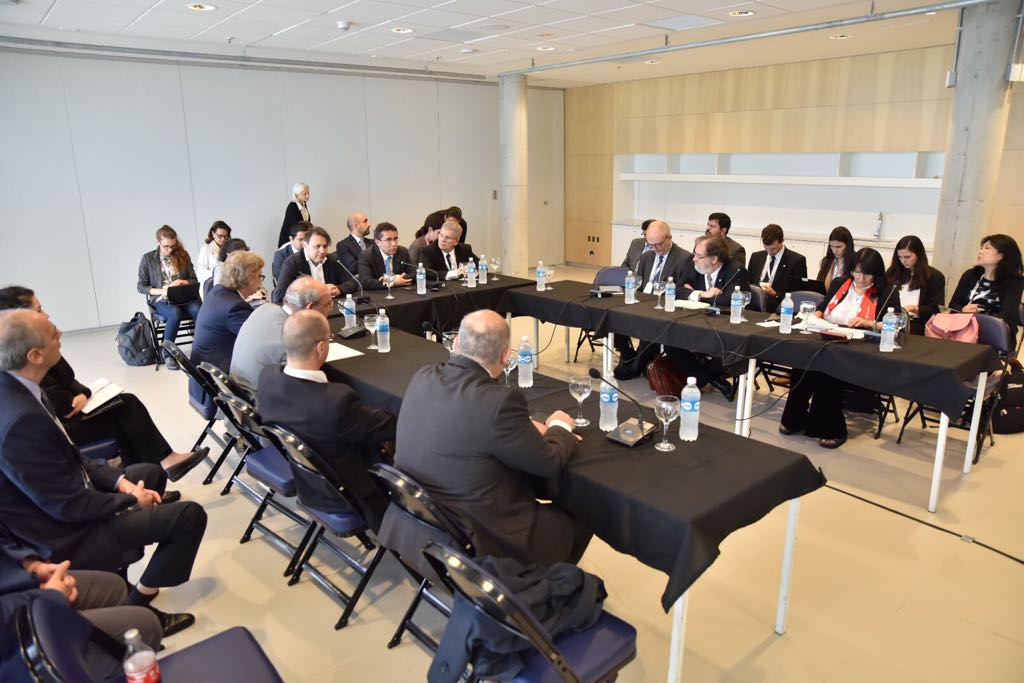More than 400 people attended today the opening of the most important regional event in the energy industry in Latin America and the Caribbean.
Montevideo, Uruguay December 11, 2018. The 3rd edition of the Energy Week, organized by the Ministry of Industry, Energy and Mining of Uruguay (MIEM), the Latin American Energy Organization (Olade) and the Inter-American Development Bank (IDB), received more than 400 attendees on its first day.
During the opening, the Under-Secretary of Industry, Energy and Mining of Uruguay, Guillermo Moncecchi, mentioned that “it is a great honor for Uruguay that the III Energy Week is held here, as it occurs within the framework of the collaboration of many years with the Inter-American Development Bank and the Latin American Energy Organization. ”
For his part, the Executive Secretary of Olade, Alfonso Blanco said that “the Energy Week is a space designed to break down the existing gaps in our countries. It is an exchange of experiences about the lessons learned, which contributes an enormous wealth. We continue to live in the greenest region of the planet with the largest share of renewable energies. This is the result of the great utilization of resources that we have in the region and the good use of hydropower and biomass. ”
The IDB representative in Uruguay, Morgan Doyle, highlighted the organization of the event, whose implementation in Montevideo arose from the Uruguayan proposal presented in 2017 at Olade’s last meeting of energy ministers and added: “In recent years the IDB has allocated in average US$1.300 million annually in Latin America and the Caribbean, for the development of economic integration projects and about US$6 million on average in the form of non-reimbursable technical assistance. It is necessary to continue fostering the development of integration initiatives. In that regard, the III Energy Week seeks to motivate the consolidation of the Central American Electrical Interconnection System (SIEPAC), the continuity in the development of the Andean Electrical Interconnection System (SINEA), the Electric Interconnection System in the Caribbean (ARCONORTE), and promote greater energy integration in the countries of ConoSur that maximizes the benefits of energy economic integration. ”
During the press conference offered by the main spokespersons of the event (MIEM, OLADE and BID) the main topics that will be developed during the 5 days of this meeting were highlighted; social inclusion, renewable energies, smart networks and their access, as well as the promotion of gender equality in the energy industry of the region.
Events held
During the first day of the Energy Week the following events were held: SEforALL Block, Renewable Energy – Energy and Access, Gender and Economic Autonomy of women in the productive sector and the LI Council of Experts of Olade.
Within these events different dialogue roundtables were developed, among which the “Technological Innovation in the use of renewable energy sources” stand out. Roland Roesch, Deputy Director of the Innovation and Technology Center of IRENA, participated in this space.
At this roundtable, Roland Roesch, Deputy Director of IRENA’s Center for Innovation and Technology commented: “The energy transition is already happening and nothing is going to stop it. The energy sector needs to be decarbonised, with a focus on the transport sector, where more efforts have to be made. The sum of the different systems is part of the efforts that must be made. Systems must be built and work from the bottom up. Digitalization is going to revolutionize the sector. ”
Another of the outstanding panels was “Experience in sectoral planning and the promotion of renewable energies”, and was made up of former authorities of the energy sector in the region; Andrés Rebolledo (Chile), Daniel Redondo (Argentina), Mauricio Bejarano (Paraguay), German Arce (Colombia) and Ramón Méndez (Former Energy Director of Uruguay). In this regard Andrés Rebolledo commented: “In 2007 after cutting off the connection with Argentina (which provided us with gas) we were in need of a transformation. The first was to have a political consensus and look at the energy sector with a view of the State (as a regulator) in the long term. ”
For his part Daniel Redondo said: “Today there are 102 projects underway, of which 19 are completed. Additionally, there are 4.400 million dollars in execution, based on private investments. ”
On the subject Germán Arce commented: “Following the crisis of the 90’s, although Colombia is a country rich in energy resources, an important institutionality should have been generated. We have abundant and cheap energy, but in a country affected by climate change this has an important risk (the El Niño phenomenon, for example, is extremely harmful). “
On the subject of generation Mauricio Bejarano commented: “In the case of Paraguay, it has 100% water based electric generation. The first objective was to diversify the electric matrix, although there is still sufficient hydric potential. ”
Finally, Ramón Méndéz commented: “In Uruguay about 40% of the electricity matrix is wind and 98% of the energy of the global matrix is renewable. We broke a false paradigm that was to show that we could design a 100% dispatch system based on a total renewable generation. “
